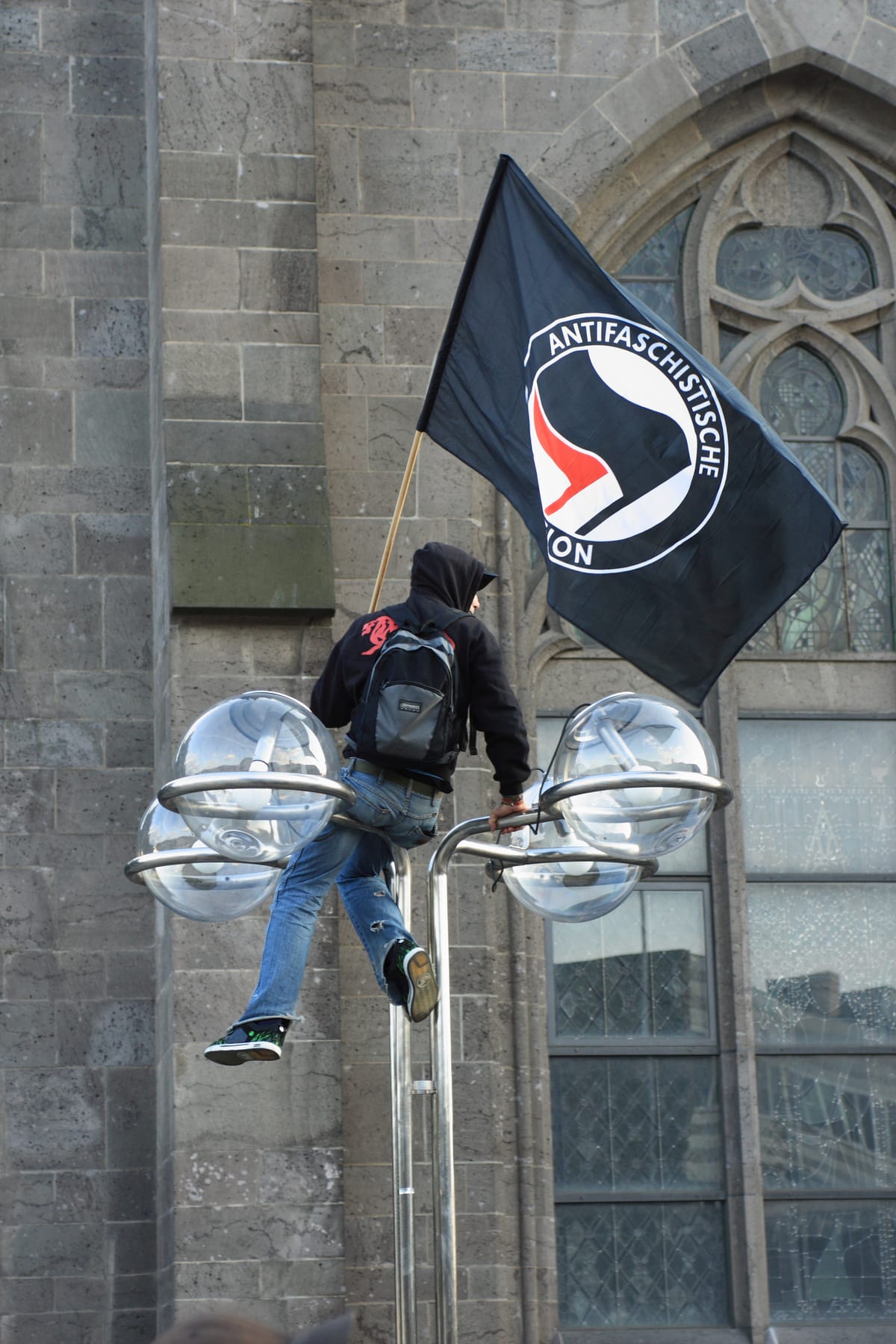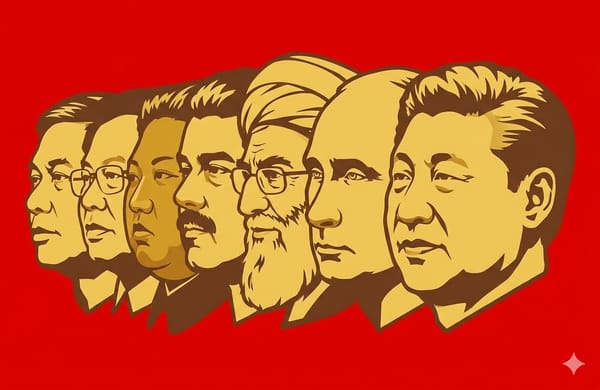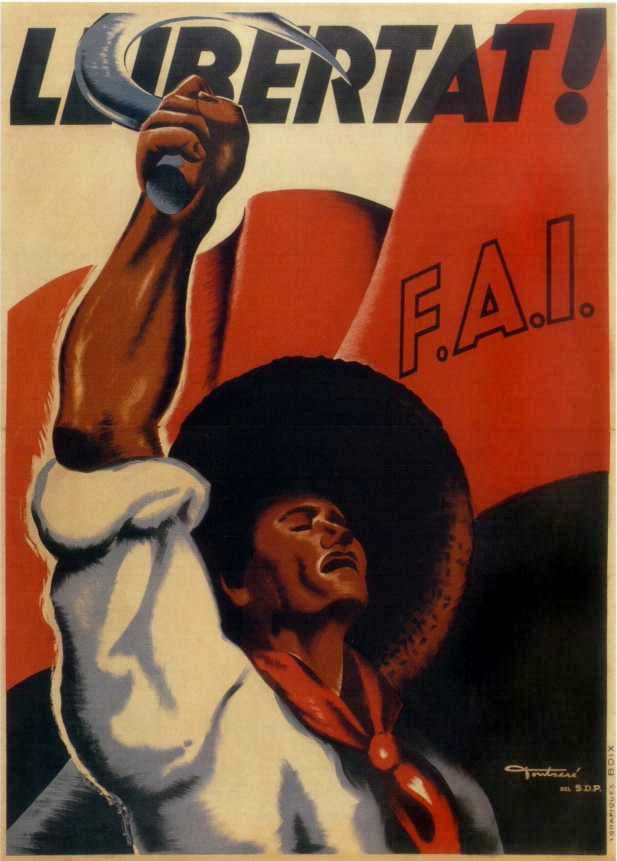Black VS Brown: Understanding and Responding to Fascism as an Anarchist

In many ways Fascism and Anarchism represent the two poles of the political spectrum. Anarchism promises the complete decentralization and equalization of political and economic power. Fascism promises it's concentration in the hands of a very exclusive group and has thus achieved a reputation opposite that of Anarchism. Whereas the mainstream attitude to Anarchism thinks of it as liberty and equality taken to its worst extremes, the mainstream's attitude to fascism thinks of it as authority and elitism taken to their worst extremes.
But since Anarchists practice a critical theory that aims to understand the underlying social realities rather than merely accepting illusions produced by privilege and power, Anarchists need to understand fascism at a deeper level. The revolutionary left has largely failed to do this. Fascism came about during a time of social upheaval between world wars one and two (the interwar period) in which workers, peasants, socialists, communists, and right-wing nationalists were rising up and threatening the endurance of the capitalist world-system. Fascist movements moved into power, often supported by the existing elites, and used the jackboot on minorities, workers, and leftist movements.
As a result, the predominant analysis of fascism from the revolutionary left argued that fascism was merely a repressive appendage of capitalist power, especially when social revolution is on the table. The "agent theory" of the Soviet led Comintern had it that Fascism was merely an agent of the capitalist state designed to destroy revolutionary workers' movements. The slightly more nuanced "Bonapartist theory" of Trotsky and Gramsci analyzes fascism as a reactionary movement of the petty bourgeoisie which is at first utilized by the bourgeois state and then becomes an enemy of that same state due to its irrationally reactionary tendencies. While theories such as these are plausible if one simply examines what fascist movements did when immediately seizing power, a more probative investigation of fascist theory and practice suggests that it is woefully inaccurate.
Fascists in power in Italy and Germany weren't interested in being mere appendages of capitalist power. They in fact ransacked the bourgeois democracies in which they took power and established single party states and personal dictatorships which subordinated business interests to a fervent nationalist ideology. Rather than being petty bourgeois fascist movements were historically cross class. Hitler's final solution, while being born of the scientific racism of capitalist-imperialist Europe, was actually overtly hostile to it.
Capitalist-imperialism utilizes racism to turn racial minorities into a readily exploitable labor force. Capitalist-imperialism has obviously used racism as pretext for mass murder, but the structural directive has always been to turn racial minorities into an easily exploited labor pool. As noted by sociologist Immanuel Wallerstein, Hitler's goal of Aryan purity directly contradicted this structural imperative. The post-war liberal intelligentsia faired just as badly in understanding fascism.
It was precisely the ideological fanaticism outlined above which convinced liberal academics that fascism was an intellectually emptyheaded form of political barbarism who's only real commitment is fanatical anti-modernism. While you might be persuaded of this analysis if all you did was look at fascist violence and pronouncements about past glory, it hardly explains fascism as a political phenomenon. Why would anti-modern, anti-intellectuals, create their own intellectuals and functionaries, or build their own modern architecture, infrastructure, and institutions? Liberal scholarship made essentially no progress on the issue until the 90s.
With the publication of Oxford political scientist Roger Griffin's The Nature of Fascism in 1991 a new field of academic research on fascism developed in the ensuing decades that would be dubbed "Comparative Fascist Studies" or "COMFAS". The COMFAS consensus came to be that fascism is an autonomous genus of political ideology whose mythic core in its various permutations is a revolutionary form of palingenetic populist ultranationalism. Fascism is an overarching political ideology like liberalism, socialism, and conservatism.
Fascism maintains a form of nationalism which defines membership in the national community in exclusivist terms (ultranationalism). It sees the existing order as corrupted by economic materialism and multiculturalism which degrades, disempowers, and disregards the members of the national community in the interests of a morally corrupt elite (populism). It aims to draw on a myth (in this context a myth is simply a political narrative) of the nation's historic glory and/or struggle to revitalize the nation (palingenesis means "new birth") in order to carry out a social revolution against the existing order that destroys all elements which are alien to the national community.
This consensus was adopted because unlike traditional liberal and Marxist analysis it provides a unified explanation of fascist arguments and movements. The biggest achievement of fascism as a social movement was the creation of Hitler's Germany and Mussolini's Italy. Other fascist movements marched through Europe in the interwar period, but they largely failed to take power. In response various conservative dictatorships such as those of Horthy, Franco, Salazar, and Imperial Japan, adopted fascist aesthetics and either abandoned them after the defeat of Italy and Germany, or were defeated along with them.
Fascism takes the nationalist and racist myths of world capitalism and fashions a new anti-capitalist ideology of the far right based on total subordination of human activity to nationalist goals. This goal obviously requires not only the elimination of those outside and dissenting from the norms of the national community, but it also requires constantly mobilizing the nation toward heroic achievement. To this end the fascist states of Italy and Germany constructed police states which aimed to control all of public life. It was this "totalitarian" politics which social theorists of the Marxian Frankfurt School became fascinated with.
Erich Fromm thought of Totalitarian politics as an "escape from freedom" in which the masses traded self-determination for perceived security. Max Horkheimer and Theodore Adorno saw Totalitarianism and the Holocaust it produced as the worst perversion of enlightenment rationality where industry and the state apply scientific methods of domination and control.
While these and other thinkers were able to capture much about life under the ideologically driven state-capitalist projects in fascist and communist states the "totalitarianism" they described was not the final goal of fascism. While the communist states more and more sidelined their ultimate vision of a classless society of free producers for pragmatic engagement in the world-economy and interstate system of capitalism, fascists moved more and more to what Roger Griffin called rooted modernism. Not only were both fascist regimes "irredentist" in constantly looking to claim more territory regardless of the interstate hierarchy which dictates sovereignty in the capitalist world.
Wallerstein points out that Hitler's ultimate goal was replacing the capitalist world-economy with a German world-empire. Unlike a world-economy which is based on buying and selling, a world-empire is based on direct exploitation of the laboring population by a military bureaucratic state. It was this dogged antisystemic posture and the gruesome display of barbarism put on by the Nazi march through Europe that led to the overthrow of the fascist regimes and the crushing of fascist movements. Despite the fact that fascism has been a go to political snarl word since fascism came into existence, fascists have essentially been excluded from even the most right-wing halls of power.
Fascists after WW2 delt with political marginalization in two broad ways. Many of them turned to a kind of "metapolitical" fascism which aimed to achieve the national revolution through critique of the dominant culture and experimentation with new forms of culture which expressed the national essence. Others turned to terrorism, carrying out hate crimes and attacks on the public designed to inspire the nation to rise against the existing order. This is the real danger of fascism today, non-state terrorism.
This terroristic threat makes the continuation of militant anti-fascism beyond WW2 a necessity. Anarchists must fight fascist movements and ideology wherever we find them and defend those their violent frustration with being on the losing side of history threatens. In fact, as fascists grow more desperate acts of violence may spike. It doesn't take an Anarchist to see the problems with fascism.
Even the majority of far-right nationalists recoil at fascism's total subordination of the human spirit to abstractions of race and nation with little basis in social scientific fact. However, unlike the political mainstream Anarchists have a critique of nationalism that allows us to see that even though liberalism, conservatism, and Marxism-Leninism have the ability to crush fascism, they do not have the ability to solve the root problems that produce it. The virulent exclusivism, anti-humanism, and anti-universalism of fascism are intensifications of the latent exclusivism within nationalist politics and ideology.
Rather than structuring human communities around voluntary associations built on mutual recognition of the agency possessed by all human beings, nationalism carves up the human community into those who belong and those who don't. There are those who are part of the national community and those who aren't. Nationalism thus designs social relations to include those who are part of the nation so defined and exclude those who are not. Thus the need for a central coercive power which discriminates against those outside the nation and empowers those inside the nation arises: the nation-state.
The problem at the root of fascism and other virulent forms of nationalism can only be overcome by Anarchism. Anarchism is the only political movement which aims to immediately replace the nation-state with free interregional associations. Anarchism is the only philosophy which calls for the rejection of nationalist cosmology in favor of a cosmology of universal freedom. Humanity has no country.
Further Reading
Fascism: Key Concepts, Griffin
Historical Capitalism, Wallerstein
Capitalist Civilization, Wallerstein
World-Systems Analysis: An Introduction, Wallerstein
https://redandblackanarchists.com.au/the-basics-of-anarcho-syndicalism/
https://plato.stanford.edu/entries/critical-theory/





